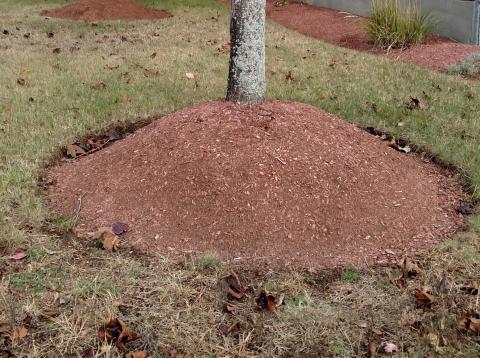How to Mulch Trees and Shrubs

*Pictured above: improperly applied mulch
There’s no arguing that mulching trees and shrubs is a good idea. Among its many benefits, mulch conserves soil moisture, suppresses weeds, and protects the trunks of plants from damage from mowers and string trimmers. However, while mulching may be a seemingly easy task, it does take a little understanding to be done well. Though the benefits of mulch are many, if improperly applied it can do more harm than good (pictured above).
Organic mulches are the best choice for trees and shrubs, and bark mulch and woodchips are probably the most common materials used. Begin by weeding the area where the mulch is to be applied. Next, spread two to three inches of mulch evenly from trunk to the dripline of the plant, keeping the mulch at least three inches away from the trunk or branches. It’s as simple as that!
While a little bit of mulch is good, too much can be detrimental. It may be tempting to apply a fresh layer every spring, but it may not be necessary. If much more than three inches of mulch is spread, problems can begin to develop. Deep mulch can create excess moisture and invite insect, rodent, and disease to take up residence. Many well-meaning gardeners injure their plants by creating “mulch volcanoes” by piling mulch up around the trunk. When excess mulch is piled against the bark, it may begin to rot, causing further disease and insect problems. Trees that escape issues with rot may start to develop new secondary roots from the trunk. These secondary roots are prone to girdling the trunk and primary roots. Excess mulch can also provide habitat for voles which eat the bark off of trees, often killing them.
The symptoms and results of over-mulching may take years to appear, but it is safe to assume that an over-mulched tree is in for a long, slow death.
Got questions? The Ask UNH Extension Infoline offers practical help finding answers for your home, yard, and garden questions. Call toll free at 1-877-398-4769, Monday to Friday, 9 a.m. to 2 p.m., or e-mail us at answers@unh.edu.
